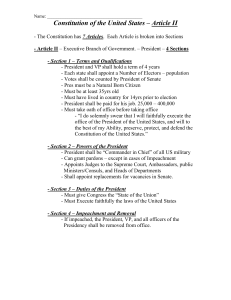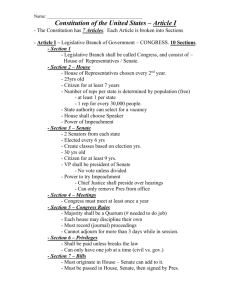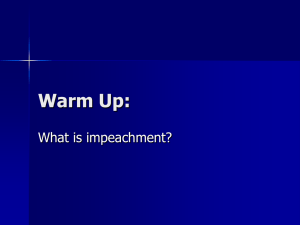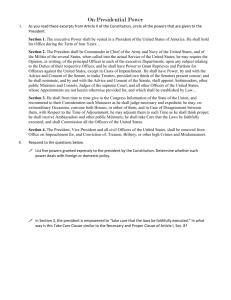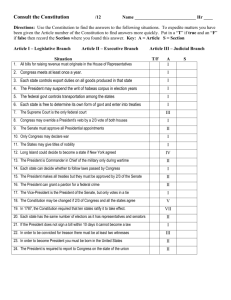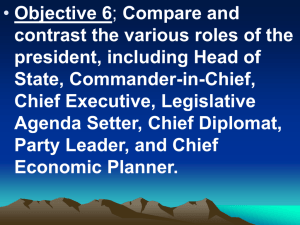File
advertisement
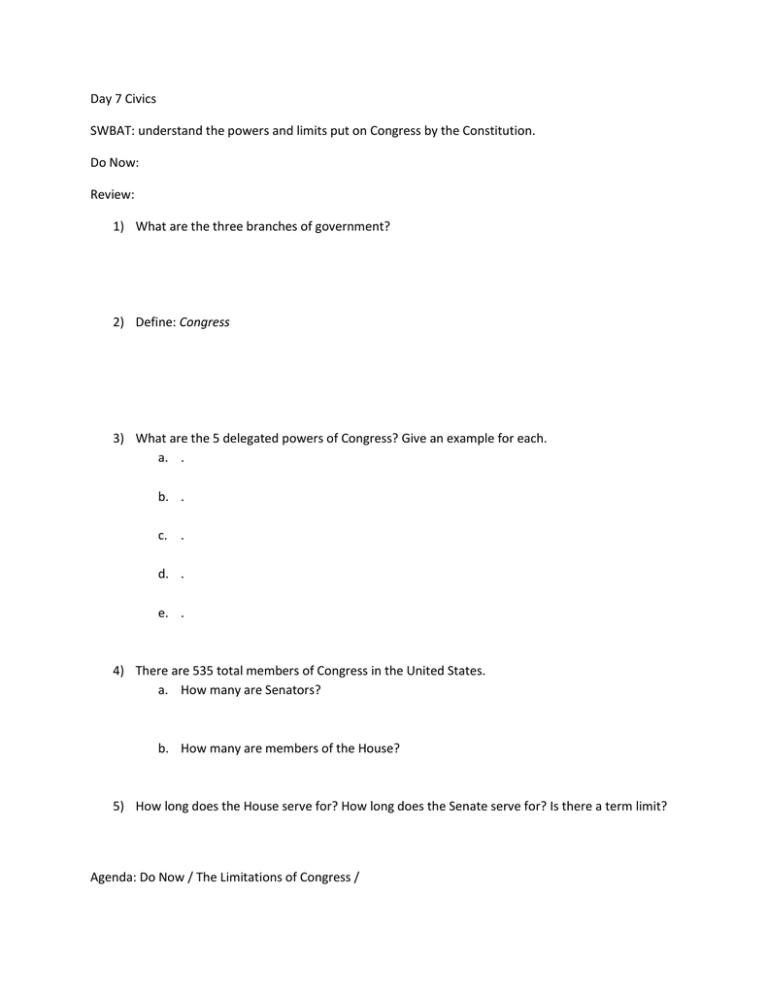
Day 7 Civics SWBAT: understand the powers and limits put on Congress by the Constitution. Do Now: Review: 1) What are the three branches of government? 2) Define: Congress 3) What are the 5 delegated powers of Congress? Give an example for each. a. . b. . c. . d. . e. . 4) There are 535 total members of Congress in the United States. a. How many are Senators? b. How many are members of the House? 5) How long does the House serve for? How long does the Senate serve for? Is there a term limit? Agenda: Do Now / The Limitations of Congress / Other Powers of the Congress… Impeachment… Bom, bom, baaaaaa The Constitution defines the way to remove officials from office when they have failed their job. This process is called impeachment. To be removed from office by impeachment, a person must be found guilty of treason, bribery, or other high crimes and misdemeanors. By high crimes and misdemeanors the founding fathers meant a crime more serious than a traffic ticket. In order for the impeachment process to begin, the House of Representatives must believe that an official has committed one of the abovementioned offenses. The House will then come up with a list of charges against the official. If these charges are credible, they are then passed to the Senate and the person is impeached. The next step of the process continues in the Senate. The senators act as the jury and hear both sides of the case against the accused official. When it is the President being tried, the Chief Justice of the Supreme Court acts as the judge. Two thirds of the Senate must agree in order for the official to be convicted of the charges and removed from office. In all of the United States history, no President has ever been removed from office by impeachment. Three Presidents however have gone through part or all of the impeachment process. In 1867, President Andrew Johnson was charged with several offenses, and the House voted to impeach him. The Senate held the trial, and when the vote was taken, Johnson escaped being convicted by one vote!!! In 1974, the House of Representatives began to investigate President Nixon and his involvement with the break-in of the Watergate Office Complex in Washington, D.C. By the end of July 1974, the House had prepared several charges against President Nixon. Instead of letting the impeachment process go any further, Nixon resigned as President on August 9, 1974. Nixon was the first and only President to resign. In 1998, the House of Representatives brought charges of obstruction of justice and perjury against Bill Clinton, our 42nd President. Define: Impeachment What crimes can lead to impeachment? Where does the impeachment process begin? When does the person become impeached? Where is the impeachment trial held? Who are the Jurors for this trial? How does one find the defendant guilty with 100 jurors? Does it have to be unanimous? Who serves as the Judge if the trial concerns the President? A History of Impeachment: How many Presidents have gone through part or all of the impeachment process? Impeached Presidents: Who is the President pictured to the right that was impeached in 1998? () What were the charges against him? () () This President came closest to getting impeached, missing being found guilty by only one vote. Who was this man? This man found himself under impeachment proceedings in 1974. Explain why he wasn’t necessarily impeached. () Over the past few weeks we’ve talked about what powers the Constitution gave to Congress. Now we are going to look at what the Constitution told the Congress it could not do! First the Constitution told the Congress it could not make any laws outlawing the slave trade until 1808. This clause deals with the rivalry between the northern and southern states. This question would eventually divide the country with the Civil War. Why do you think the Congress opted to delay a decision on Slavery? The second limitation deals with the legal term known as habeas corpus. Habeas corpus literally means “you shall have the body.” The right of habeas corpus allows a person to be seen and heard in a courtroom by a judge. If you are found guilty or not guilty, you have the right to appear in court. The government cannot take that right away except in cases of rebellion, terrorism, or periods of martial law. What right does habeas corpus grant you? The Constitution outlawed bills of attainder. A bill of attainder is a law passed by the government that convicts a person of a crime and punishes them without a trial. What is a bill of attainder? Another limitation set by the Constitution is that Congress cannot pass ex de post facto laws. An ex post facto law punishes people for a crime that was not a crime when they did it. For example, Mr. Z was smoking a cigarette on his lawn on Monday. On Tuesday, Congress passed a law for smoking in the United States. Wednesday, the police came and arrested Mr. Z for smoking on Monday. When Mr. Z was smoking on Monday, it was not a crime. Under the ex post facto clause of the Constitution, punishment of Mr. Z is forbidden. Define: ex post facto law Create your own scenario to explain the ex post facto clause: Other limits on Congress are that it cannot tax products from a state, it cannot give preference to any state’s seaport, government money can only be spent by passing a law, and finally, Congress cannot issue titles of nobility. That means that the Senate or House cannot make people knights, lords or duchesses. Think: What about our history would make us not want to have Knights, Lords, Duchesses’, etc.? The Constitution also puts certain limits on the states. First, they cannot make treaties with other countries. Secondly, they cannot coin their own money. Why couldn’t individual states coin their own money??? Why is it important that there are certain limits to Congress?

